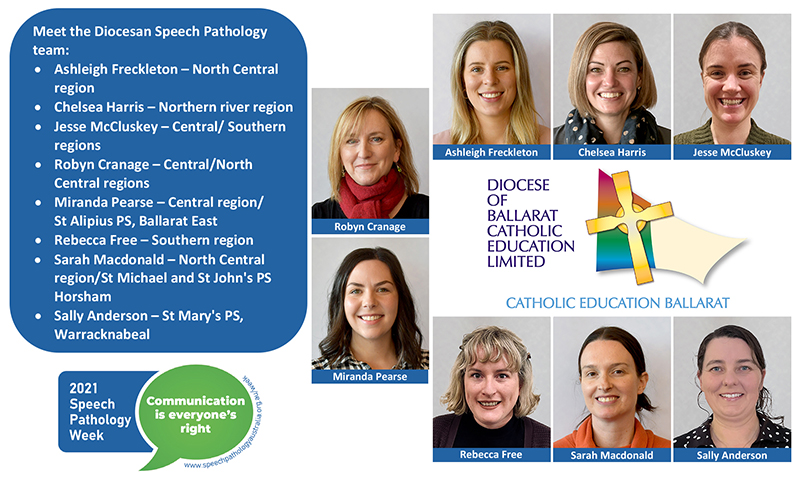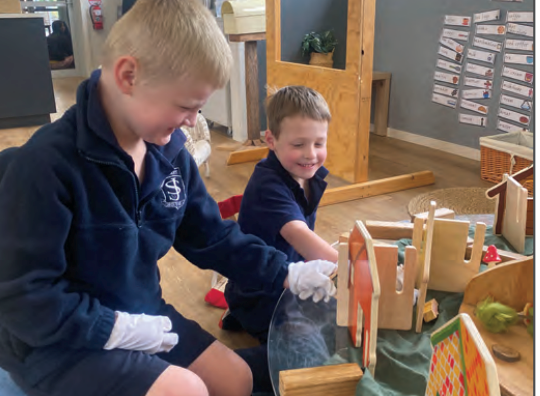Speech Pathology Week: ‘Communication is everyone’s right’
Monday 23 August, 2021
The Catholic Education Ballarat Speech team work in both primary and secondary schools across our diocese, to support students with varying communication difficulties including speech, language, reading, writing, voice and fluency problems. We work individually with students, in small groups, in boost groups, as well as in classrooms alongside class teachers. We partner with schools through consultation, teacher planning, professional learning for teachers and Learning Support Officers, parent workshops, Dynamic assessment and ‘Wrap around the Learning’ (WATL) meetings. We have been engaged in the Oral Language Supporting Early Literacy initiative across our diocese since its inception into the diocese over 10 years ago. Our professional association, Speech Pathology Australia (SPA), has produced a resource for speech pathologists who work in schools, which is available here.
There are 1.2 million Australians with communication disability. Our diocesan Speech Pathologists work to ensure that communications is everyone’s right.
“In Australia today, communication disability remains largely invisible. Unseen and out-of-sight,”
The coronavirus (COVID-19) pandemic has highlighted the challenges faced by Australians with communication disability.
That’s why during Speech Pathology Week, from 22-28 August, our Diocesan Speech Pathology team is highlighting the week’s theme: Communication is everyone’s right. We are proud to focus on the critical importance of communication in all of our lives and its foundational role in academic, social and emotional wellbeing and learning.
Communication is a basic human right. It is fundamental to person’s ability to participate fully in the social, educational, economic and sporting aspects of our community.
“Many Australians with communication disability cannot maximise educational, health and social outcomes, without the support of a speech pathologist’. Only 38 per cent of Australians with communication disability are participating in the workforce, compared to 80 per cent of people without communication disability.
People with communication disability are also less likely to have a non-school qualification (42 per cent), than those without communication disability (61 per cent).
“Communication, by definition, involves at least two people. It is important that everyone understands that communication is more than speech.
“Australians with communication difficulties communicate with others using a variety of means, including word-based or picture-based communication boards or books, sign and gesture, and spelling.
“Technology is playing a growing and vital role in keeping Australians with communication difficulties engaged with their family, friends and those across our diocese.
Assistive technology, such as electronic communication and speech generating devices, voice amplification and computer access aids (including eye-gaze mouse control and head tracking devices) allow people with communication difficulties to communicate with those around them.
The Australian Bureau of Statistics has established that 1.2 million Australians have communication disability. Communication disability affects a person’s ability to understand and be understood by others.
- Levels of limitation range from mild to profound and can be temporary or last a lifetime.
- Children and older people make up the majority of people with communication disability.
- Children are more likely to have profound/severe communication disability than older people.
- People with communication disability were less likely to have a non-school qualification (42%) than people without communication disability (61%).
- Thirty-eight percent of people with communication disability are participating in the labour force compared with 80% of people without communication disability.
- One in 7 people with communication disability need formal assistance with communication.
- Half of all people who need formal assistance with communication have an unmet need for this assistance.
- Three in 5 people who have an unmet need for formal assistance with communication were children.
For information about Speech Pathology Week visit www.speechpathologyaustralia.org.au/week

